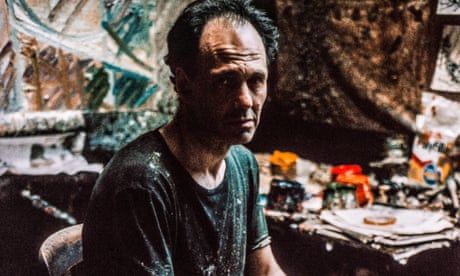
Jane Bown’s portrait of the artist, who died last week aged 93, captured the obsessive nature of the painter who saw no divide between his life and work
The Observer’s Jane Bown took this portrait of the painter Frank Auerbach in 1986, when he was chosen to represent Britain at the Venice Biennale. Auerbach, who died last week aged 93, was already by then a figure of renowned artistic compulsion. Laurence Marks, whose interview ran alongside Bown’s portrait, marvelled at his “austere and solitary communion with his pictures”. Auerbach had arrived in Britain on a kindertransport aged seven, and after the war discovered that his parents had perished in concentration camps. Finding his vocation as an artist at 25, he had, Marks observed, subsequently “worked seven days a week, nearly every week of the year, starting at 7am and continuing until 9pm in the same studio in Mornington Crescent, painting the same handful of friends and the same half-dozen or so London scenes over and over”.
Bown’s portrait seems to capture all of that sense of Auerbach’s refusal to see any margin between life and work; his clothes and the floor and every surface of the studio have become alternative canvases. He never let up, discarding and scraping and reimagining each painting, with layer upon layer of pigment, until it resolved itself into something he could live with.
Continue reading...